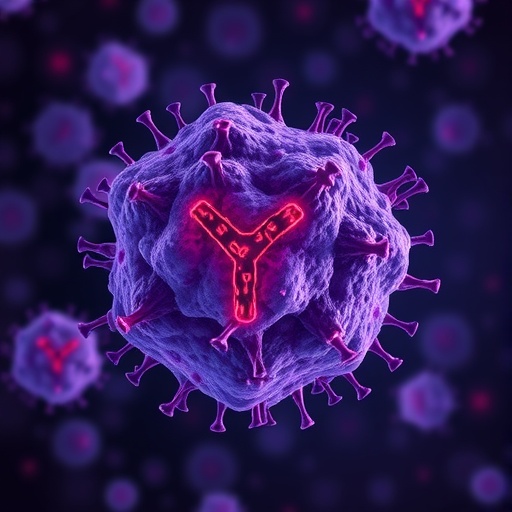A groundbreaking study led by researchers at the University of Arizona Comprehensive Cancer Center has offered unprecedented insights into how the loss of the Y chromosome in male immune cells detrimentally impairs immune function, potentially elucidating long-standing mysteries about the link between chromosomal loss and lower cancer survival rates in men. This pivotal research, detailed in the paper titled “Concurrent loss of the Y chromosome in cancer and T cells impacts outcome,” was published in the prestigious journal Nature, marking a significant advancement in cancer biology and immunogenetics.
In human males, most somatic cells typically carry one X and one Y chromosome, the latter imparting male-specific genetic identity. However, a phenomenon known as "loss of Y" (LOY), where immune cells in circulating blood lose the Y chromosome, is a relatively common, nonheritable genetic alteration predominantly seen with advancing age. This chromosomal loss has been epidemiologically linked to increased morbidity and mortality from various carcinomas, yet the biological mechanisms underpinning these associations have remained elusive until now.
The innovative research spearheaded by the team at the University of Arizona illuminates how LOY in white blood cells, particularly in T lymphocytes, undermines the immune system’s ability to effectively identify and eradicate cancerous cells. T cells are central players in immune surveillance; cytotoxic T cells directly attack tumor cells, while helper T cells orchestrate broader immune responses. The absence of the Y chromosome in these cells appears to correspond with a diminished cytotoxic response, thereby weakening cancer immunosurveillance and allowing tumors to progress unchecked.
Crucially, this investigation revealed that LOY is not confined to malignant epithelial cells within tumors but also manifests in the surrounding noncancerous stromal components, including connective tissue and immune effector cells. This concurrent loss underscores a coordinated genomic instability in the tumor microenvironment, suggesting a more systemic influence of LOY on cancer pathogenesis and progression.
At the molecular level, the researchers identified that T cells lacking the Y chromosome exhibit compromised functional capacities — their ability to mount an effective anti-tumor immune response is significantly impaired. This functional deficiency supports a model where tumors can exploit LOY-associated vulnerabilities in immune cells to evade detection and destruction, effectively hijacking the host’s immune defenses to facilitate more aggressive disease.
The clinical ramifications of these findings are profound. Men exhibiting LOY in both cancerous epithelial cells and infiltrating T cells tend to develop more virulent cancers and suffer from poorer overall survival rates compared to men without such chromosomal aberrations. This dual loss acts synergistically, compounding the failure of immune containment and tumor suppression mechanisms, ultimately enabling cancer cells to escape immune eradication more efficiently.
From a therapeutic vantage point, the study raises critical considerations for the development and optimization of existing immunotherapies. Immunotherapeutic approaches, including chimeric antigen receptor (CAR) T cell therapy, rely heavily on the functionality of T cells derived from the patient’s immune system. If these cells harbor LOY, their anti-cancer efficacy might be inherently compromised, potentially explaining variability in therapeutic responses and treatment resistance observed in male cancer patients.
This research consequently advocates for the pre-treatment screening of patient-derived immune cells for LOY status before their utilization in adoptive cell transfer therapies. Such stratification could refine patient selection, optimize therapeutic outcomes, and inspire the design of novel interventions aimed at mitigating the detrimental impact of Y chromosome loss in immune cells.
The genesis of this investigation traces back to Dr. Dan Theodorescu, the director of the University of Arizona Cancer Center and Nancy C. and Craig M. Berge endowed chair, who previously identified LOY in malignant epithelial cells. His curiosity about the broader implications of LOY led him to collaborate with Dr. Simon Knott, a longtime scientific partner, culminating in this landmark study that links chromosomal loss to compromised immune function and adverse cancer prognosis.
Beyond its immediate clinical implications, the study pioneers a new frontier in the Y chromosome research field, an area historically overshadowed compared to the broader chromosomal and genetic research landscape. It opens avenues to explore how sex chromosome genetics influence cancer biology and immune function, potentially reshaping personalized medicine approaches for male patients.
Technically, the study employed advanced genomic sequencing techniques to analyze tumor and immune cell populations from a cohort of male cancer patients. These analyses unveiled that LOY in T cells corresponds with distinct transcriptional changes, dampening genes involved in cytotoxicity and immune activation, thereby elucidating the molecular basis of impaired immune response in affected individuals.
Furthermore, these insights may reverberate beyond oncology, given that LOY in immune cells has also been implicated in other age-related diseases, including cardiovascular conditions and neurodegeneration. Understanding the interplay between LOY and immune dysfunction thus holds promise for broader biomedical applications.
To summarize, this seminal work bridges a critical knowledge gap by elucidating the dual impact of Y chromosome loss in both cancer cells and immune effector cells on cancer progression and patient outcomes. It highlights an intimate connection between genetics, immunology, and oncology, offering a refined lens through which to examine male-specific vulnerabilities in cancer biology. Ongoing research inspired by these findings is anticipated to drive transformative strategies in cancer detection, prognosis, and immunotherapy, ultimately aiming to improve survival rates in men who suffer from cancers compounded by chromosomal instability.
Subject of Research: The impact of Y chromosome loss in immune cells and cancer cells on cancer progression and patient survival.
Article Title: Concurrent loss of the Y chromosome in cancer and T cells impacts outcome
Web References:
- Nature Journal Article: 10.1038/s41586-025-09071-2
- University of Arizona Comprehensive Cancer Center: http://cancercenter.arizona.edu
- College of Medicine – Tucson: http://medicine.arizona.edu
References:
The original research article published in Nature, volume and issue linked via DOI 10.1038/s41586-025-09071-2
Keywords:
Cancer, Cancer Immunotherapy, Chimeric Antigen Receptor Therapy, Adoptive T Cell Therapy, Cancer Treatments, Immunotherapy




